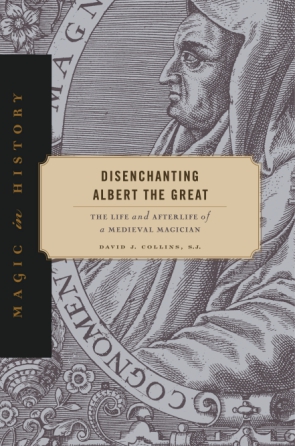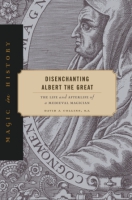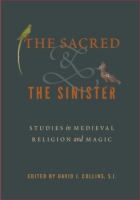
Disenchanting Albert the Great
The Life and Afterlife of a Medieval Magician
David J. Collins, S. J.
Disenchanting Albert the Great
The Life and Afterlife of a Medieval Magician
David J. Collins, S. J.
“This is an interesting and erudite study that explores the shifting meanings of magic in Western society while questioning macronarratives about the disenchantment of the world.”
- Description
- Reviews
- Bio
- Table of Contents
- Sample Chapters
- Subjects
Over the centuries, Albert was celebrated for his magic, or it was explained away—but he was never condemned. In the fifteenth century, members of learned circles first attempted to distance Albert from magic, with the goal of exonerating him of superstition, irrationality, and immorality. Disenchanting Albert the Great discusses the philosopher’s own understanding of magic; an early, adulatory phase of his reputation as a magician; and the three primary strategies used to exonerate Albert over the centuries.
In the end, Disenchanting Albert the Great tells the story of a thirteenth-century scholar who worked to disenchant the natural world with his ideas about magic but who himself would not be disenchanted until the modern era. This accessible and insightful history will appeal to those interested in Albert the Great, Catholic Church history, the history of magic, and Western understandings of the natural and the rational over time.
“This is an interesting and erudite study that explores the shifting meanings of magic in Western society while questioning macronarratives about the disenchantment of the world.”
“Albertus Magnus was a great churchman and theologian. He also, as David Collins shows, took a serious interest in magic, which he thought could explain natural processes. Albertus engaged with magic, as he explained, by reading texts but also by trying things out. As ideas about nature evolved, he played many roles in the thought of later periods, from magus to saint to rationalist. This lucid, learned, and thoughtful book is intellectual history at its best.”
“David J. Collins has produced a superbly researched, cleverly written, and at times controversial analysis of Albert the Great’s postmortem reputation. It is a must-read for anyone interested in Albert, medieval or early modern magic and other esoterica, or premodern intellectual history more broadly.”
David J. Collins, S.J., is Associate Professor of History at Georgetown University. He is the editor of The Sacred and the Sinister: Studies in Medieval Religion and Magic, also published by Penn State University Press.
List of Illustrations
Acknowledgments
List of Abbreviations
Timelines
Introduction: Telling a Medieval Magician
1. Albert’s Magic
2. The Magical Albert
3. Albertus Sanctus
4. The Historical Albert
5. The Encyclopedic Albert
Epilogue: Disenchanted Albert
Notes
Bibliography
Index
Download a PDF sample chapter here: Introduction
Also of Interest
Mailing List
Subscribe to our mailing list and be notified about new titles, journals and catalogs.




